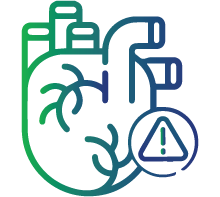
Creatine Phosphokinase MB (CPK-MB)
What is Creatine Phosphokinase MB (CPK-MB)
The creatine phosphokinase MB test measures the level of CPK-MB in your blood. CPK is an enzyme (protein) present in various body tissues like the heart, skeletal muscle, and brain. CPK-MB is an isoenzyme specifically found in the muscles of heart tissue. A high level of CPK-MB in your blood is an indication of injury to the heart muscle. CPK-MB test is also indicated to determine the functioning of the heart in recurrent heart attacks. Healthcare providers use this CPK-MB test to screen the level of CPK in your blood and detect any disease.
CPK-MB is also known as Creatine kinase test, CK-MB test, CPK-MB test.
What is CPK-MB test used for?
CPK-MB test is used in the diagnosis of:

Heart attack

Myocarditis (Inflammation of heart muscle)

Heart stroke

Recurrent heart attacks
Who should get tested?
The CPK-MB test is recommended to be performed frequently for individuals with the following symptoms and risk factors:

Tiredness

Dizziness

Nausea or vomiting

Sudden sweating

Muscle pain

Numbness or tingling sensation

Chest pain

Difficulty in breathing

Pain in the neck

Pain in the left arm

Swelling in your arms or legs

Having a dark-coloured urine
Test Preparation
No special preparation is required to take the CPK-MB test.
Interpretation of the results
The CPK-MB range may vary according to age, gender, health history, diagnostic centre, and methodology used.
The normal range of CPK in International units per litre (IU/L)
|
Gender |
CPK Normal Range |
|
Male |
55-170 IU/L |
|
Female |
30-135 IU/L |
CPK-MB (Reference Range)
The normal reference range of serum CPK-MB is 3 to 5% of total CPK, i.e., 5 to 25 IU/L.
Deviation from normal levels indicates the following:
- CPK-MB test is used by healthcare providers to help diagnose and monitor various causes of heart attacks.
- Higher-than-normal levels of CPK-MB may be due to underlying conditions like:
- Heart attacks
- History of open heart surgery
- Electrical injuries
- Injury to the heart (after a road accident)
- Heart muscle inflammation (swelling)
- Recurrent heart stroke
FAQs
What is the significance of the CPK-MB test?
The CPK-MB test determines the blood creatine phosphokinase level produced by the heart tissues of your body. The screening, monitoring, diagnosis, and follow-up of heart diseases as well as other medical conditions can all be done with a CPK-MB blood test.
What are the risks associated with the CPK-MB test?
There are no known risks. During a blood test, one may experience minor pain or bruising where the needle was inserted, but most symptoms will subside quickly.
How is the CPK-MB test performed?
During this blood test, a healthcare professional will take a small amount of blood from a vein in your arm using a small needle, which is then collected in a test tube or vial. This procedure is completed within a few minutes.
What further tests might I require if I have an abnormal CPK-MB test result?
Your CPK-MB test result will determine what kind of additional tests will be done. Your doctor might identify the cause of elevated CPK-MB levels and discuss it with you.
Further tests could consist of:
- Other blood and urine tests
- Troponin Test
- CPK isoenzymes, Electrophoresis
- Electrocardiogram (ECG)
What factors might affect my CPK-MB test results?
Factors like a diet rich in fatty acids, extreme workouts, using steroids, prolonged surgery, consuming medications that alter muscle functioning, microbial infections, blood clots due to nutritional deficiency, and aging may affect your creatine phosphokinase levels. So, it is advisable that you consult your healthcare provider before getting a CPK-MB test.

